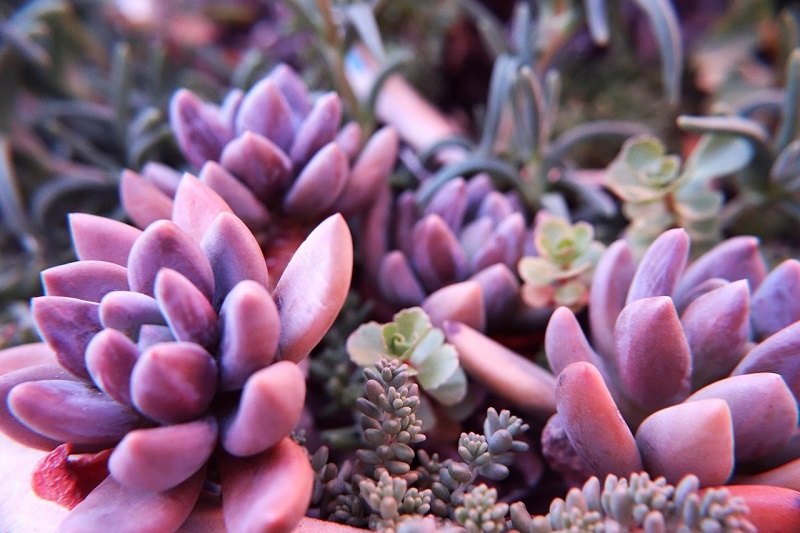Luckily, of all the succulent houseplants, Echeveria varieties are considered non-toxic and perfectly safe to grow around pets and small children. The fleshy leaves do not contain any caustic saps that cause skin irritation, even for those with the most sensitive skin. Even though this is considered to be a harmless plant, no part of Echeveria is intended to be used as food.

Is Echeveria Poisonous to Children?
Echeveria is far less likely to cause any serious problems for curious small children but as with al plants, should be kept out of reach. Any ingestion of plant material can cause intestinal upset in small children who may not be able to digest the fibers. Echeveria is also unlikely to cause skin irritation from touching the juicy leaves. There are no spines or hairlike barbs to irritate sensitive skin like those on other more dangerous succulents or cacti.
Is Echeveria Poisonous to Dogs?
Dogs and puppies are sometimes tempted to taste the world around them and are more likely to be affected by plants than other pets in your home. The good news is that Echeveria is non-toxic and not likely to cause any kind of long-term issues for your faithful furry friend. Small puppies or small dogs with more delicate digestive systems may show signs of abdominal upset if they munch on a leaf or two.
Most often they will vomit up the offending leaf and maybe only be off their feeding schedule for part of a day. If your dog does exhibit any other signs of severe distress such as labored breathing, lethargy, or continued vomiting you should consult with your veterinarian for further instructions.
Is Echeveria Poisonous to Cats?
Cats are generally less likely to take a bite of plants like Echeveria but if they do there is little reason to become alarmed. Echeverias may only cause a period of stomach upset that can easily treated at home. Vomiting or lethargy is the most common symptom when cats are bothered by eating Echeveria leaves. If symptoms persist for more than part of a day or are accompanied by breathing problems, continued diarrhea, and vomiting contact your veterinarian for further advice.
Is Echeveria Poisonous to Other Animals?
Most other household pets such as hamsters, gerbils, or lizards are not in danger of eating Echeveria due to their mostly caged lifestyles. Other less usual house pets such as ferrets or rabbits will not be bothered by any part of the Echeveria plant but should be kept away from most houseplants in general. as they may not be able to digest the leaves fully or stems.
Symptoms Of Echeveria Poisoning
Always check with your doctor or veterinarian for guidance if you suspect Echeveria is bothering your child or pet. Here are a few signs that require further investigation:
- Vomiting that does not stop
- Diarrhea, especially in small children can lead to dehydration
- Breathing difficulties that could indicate an allergic reaction
- Unexplained lethargy
Preventing Echeveria Poisoning
Even though Echeveria is considered safe to grow in households with pets and/or children, keeping it out of reach is the best protection. Keep plants out of reach by growing them on sturdy shelves or in hanging baskets where that are not accessible by curious littles. Clean up dead foliage or flower stems regularly that could fall to the floor.
Throw away any unused clippings when taking cuttings for propagation. Know the Latin name of your houseplants so that your veterinarian or poison control hotline can be informed of the exact plant you suspect your child or pet has eaten. Common names of houseplants are often colloquial and can be confused for other more toxic plants.
Pet Poison Helpline
If something were to happen to your furry friend, and you suspect that they are suffering from Echeveria poisoning, there is a poison control hotline to call for 24/7 vet advice. It is called the Pet Poison Hotline, and their phone number is (855) 764-7661.
Sources:
“Blue Echeveria.” American Society for the Prevention of Cruelty to Animals. www.aspca.org
“Are Succulents Safe to Have in the House?” Missouri Poison Center. www.missouripoisoncenter.org
